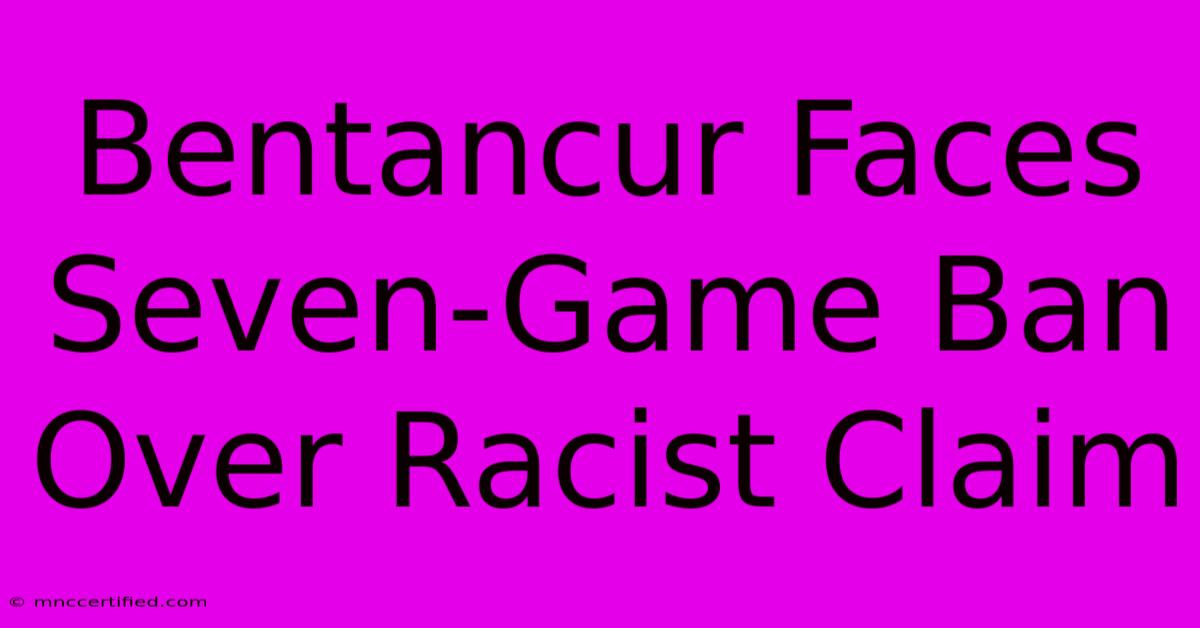Bentancur Faces Seven-Game Ban Over Racist Claim

Table of Contents
Bentancur Faces Seven-Game Ban Over Racist Claim: A Controversial Ruling
Rodrigo Bentancur, the Uruguayan midfielder currently playing for Tottenham Hotspur, is facing a potential seven-game ban following an alleged racist incident. This controversial ruling has sparked intense debate within football circles, raising questions about the fairness and effectiveness of disciplinary processes in dealing with accusations of racism. This article delves into the details of the incident, the subsequent investigation, and the wider implications of the potential ban.
The Alleged Incident and Initial Reaction
The incident reportedly occurred during a [Name of Match/Competition] match against [Opponent Team]. According to reports, Bentancur allegedly made a racist remark towards [Player Accused of Targeting], a player from the opposing team. While specific details remain scarce due to the ongoing investigation and the sensitivity of the accusations, the alleged comment sparked immediate outrage amongst fans and officials alike. The referee at the time, [Referee's Name], included a report in the match paperwork detailing the accusation.
The Investigation and the Seven-Game Ban
Following the match, a formal investigation was launched by [Governing Body, e.g., the FA, FIFA]. This investigation involved reviewing match footage, taking statements from players, officials, and witnesses, and potentially utilizing other evidence gathering methods. The investigation concluded with a recommendation of a seven-game ban for Bentancur, a penalty deemed severe by some and insufficient by others. The length of the ban reflects the seriousness with which the governing body views accusations of racism within the sport.
Public Outcry and Media Frenzy
The announcement of the potential seven-game ban ignited a firestorm of discussion across various media platforms. Many fans and commentators have expressed differing opinions regarding the severity of the punishment, the transparency of the investigative process, and the impact this ruling will have on future cases of alleged racism in football. Social media has been particularly active, with numerous hashtags trending, showcasing the significant public interest in the case. #BentancurBan, #RacistInFootball, and #FootballJustice are just a few examples of the discussions taking place online.
The Wider Implications for Football and Anti-Racism Efforts
This incident highlights the ongoing battle against racism in football. While significant strides have been made in raising awareness and implementing stricter punishments, cases like Bentancur's demonstrate the persistent challenge of eradicating discriminatory behavior from the sport. The ruling serves as a reminder of the responsibility placed upon players, officials, and governing bodies to foster an inclusive and respectful environment within football. The effectiveness of the current disciplinary measures in deterring racist behavior will undoubtedly be a subject of ongoing debate and scrutiny.
Bentancur's Response and Potential Appeal
Bentancur, through his representatives, [mention any official statements or actions], has yet to publicly comment extensively on the specifics of the allegations. However, his legal team may explore the possibility of appealing the seven-game ban, potentially arguing procedural irregularities or disputing the evidence presented during the investigation. The outcome of any appeal will significantly impact the final ruling.
Conclusion: A Complex and Evolving Situation
The Rodrigo Bentancur case is far from resolved. The potential seven-game ban underscores the gravity of accusations of racism in football and the complexities of achieving justice in such high-profile incidents. The case will likely set a precedent for future investigations, influencing how governing bodies approach similar allegations and shaping the fight against racism within the sport. The long-term impact on Bentancur's career and the ongoing conversation surrounding racial equality in football remains to be seen.

Thank you for visiting our website wich cover about Bentancur Faces Seven-Game Ban Over Racist Claim. We hope the information provided has been useful to you. Feel free to contact us if you have any questions or need further assistance. See you next time and dont miss to bookmark.
Featured Posts
-
Live Stream England Vs Ireland Uefa Nations
Nov 18, 2024
-
Is Slab Leak Covered By Insurance
Nov 18, 2024
-
Jones Demands Ufc Payday For Aspinall Fight
Nov 18, 2024
-
Katy Perry At 40 Defying Critics
Nov 18, 2024
-
3rd T20 I Australia Vs Pakistan
Nov 18, 2024